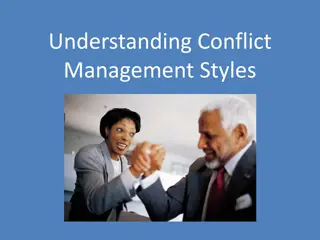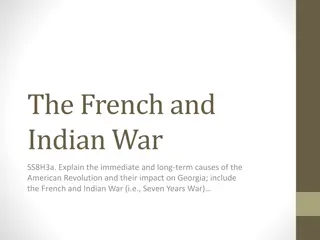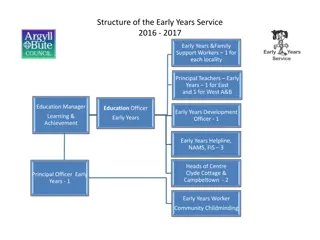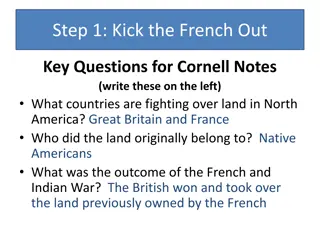The American Revolution: Early Years and Conflict
The American Revolution began with the Colonies declaring independence, leading to a war where Patriots faced many challenges against the better-equipped British forces. Loyalists, including African Americans, played complex roles in the conflict. Despite disadvantages, Americans had strengths like fighting for their land and strong leadership, ultimately valuing liberty and forming militias to fight for personal freedom.
Download Presentation

Please find below an Image/Link to download the presentation.
The content on the website is provided AS IS for your information and personal use only. It may not be sold, licensed, or shared on other websites without obtaining consent from the author.If you encounter any issues during the download, it is possible that the publisher has removed the file from their server.
You are allowed to download the files provided on this website for personal or commercial use, subject to the condition that they are used lawfully. All files are the property of their respective owners.
The content on the website is provided AS IS for your information and personal use only. It may not be sold, licensed, or shared on other websites without obtaining consent from the author.
E N D
Presentation Transcript
THE AMERICAN REVOLUTION Chapter 6 Section 1 The Early Years
Once the Colonies declared their independence, war was unavoidable The Patriots were at a serious disadvantage. They were not well trained, they were low on supplies and ammo, and not all Americans even supported the struggle for independence. British planned to crush the Patriots by force while the Patriots thought that the British would surrender after they lost 2 or 3 major battles. At least 1 out of 5 Americans were Loyalists The British had the overall advantage. They had the best army navy, extremely wealthy, and a much larger population. THE OPPOSING SIDES
A lot of Loyalists did not see what all the fuss was about and why the colonists wanted independence in the first place. Benjamin Franklin s own son William Franklin was a Loyalist. Neighbor was against neighbor, father against son and son against father, and he that would not thrust his own blade through his brother s heart was called an infamous villain. Norman Gelb A lot of African Americans were Loyalists. Virginia s governor said that any enslaved African that fought for the British would gain their freedom. A lot of people decided to do this while others decided to travel to Canada and were free there. Some others even went back to a British colony in Africa. AFRICAN AMERICANS IN WAR
Americans held their own advantages during the war. Americans fought for their land while these soldiers fought for money They were fighting on their own ground and fought with great determination to protect it. Americans had the strongest leader in George Washington. Few could match his courage, honesty, and determination. The British had to ship their soldiers over from thousands of miles away. British relied on mercenaries from other countries to fight for them.- Hessians from Germany PATRIOT ADVANTAGES
Americans placed great value on liberty and personal freedom. They did not want to transfer from British Parliament to their own Continental Congress. They made it difficult to build a continental army and raise money to fight the war. Militias played an essential role in the forces. The states were relied upon to recruit for the Continental Army Most men signed up for one year to fight. A lot of the officers were veterans from previous wars or they were young men who were recruited from the ranks Women also fought for the Patriot forces. Molly Pitcher carried water while others dressed as men and enlisted. RAISING AN ARMY
The Continental Army suffered a serious defeat against the British at the Battle of Long Island. Most of the battles involved few troops. Americans had half as many soldiers as the British during the Battle of Bunker Hill Nathan Hale was a famous spy for the Patriots who said I only regret that I have but one life to lose for my country Britain sent over 32,000 troops in just hopes that the sheer size of the army under Howe would convince the Patriots to give up. Although the Americans were brave, they lacked supplies The Patriots only had 20,000 troops but they were determined to fight. After the defeat, the British chased them all the way back into Pennsylvania. PATRIOT DEFEATS AND VICTORIES
He wanted African Americans to be free if they fought for the Patriots. In the Winter of 1776-1777, The Patriots cause was near collapse. The southerners did not want this because they were scared that if given weapons, they would revolt against the owners. The size of the army had dwindled. Some soldiers completed their services while others ran away. Washington hated to think that the war could almost be over and that they could lose. By 1778, African Americans were allowed to fight for everyone but South Carolina. They fought because they believed in the freedom that the colonies wanted. He pleaded with Congress to give him more troops LOW POINT
The British settled in New York for the winter and left some in Princeton and Trenton, New Jersey. Washington saw this as a chance to move catch them off guard. The British observed the attacks as A few days ago, the Americans had given up the cause for lost. Their late successes have turned the scale and now they are all liberty- mad again. The Americans crossed the icy Delaware River and attacked the British in Trenton. They easily defeated them and then went to Princeton and attacked them there. AMERICAN VICTORIES IN NEW JERSEY
The British worked out a battle plan in 1777. They would take Albany, New York and control the Hudson River. This would cut off New England from the Middle Colonies. The plan involved a 3-pronged attack. General John Burgoyne would lead troops south from Canada. Lt. Col. Barry St. Leger would move east from Lake Ontario, and General Howe would move north from New York City. Howe won battles in Sept. 1777 and Paoli won near Philadelphia. Their plans were coming together until they ran into obstacles with supplies and the American forces slowed them down. Burgoyne had to retreat to Saratoga to get more supplies that he had lost. A BRITISH PLAN FOR VICTORY
Burgoyne faced serious trouble in Saratoga. He expected British forces to come help but they never showed up. Burgoyne found himself surrounded by a larger army and made a desperate attack on October 7th but the Americans stood firm. The American forces had stopped St. Leger s army and Howe s forces were still in Philadelphia. On October 17, 1777, General Burgoyne surrendered and the British plan had failed. General Howe resigned as commander of the British. He was replaced by General Henry Clinton. General Horatio Gates and American forces blocked Burgoyne s path to the south. BATTLE OF SARATOGA























